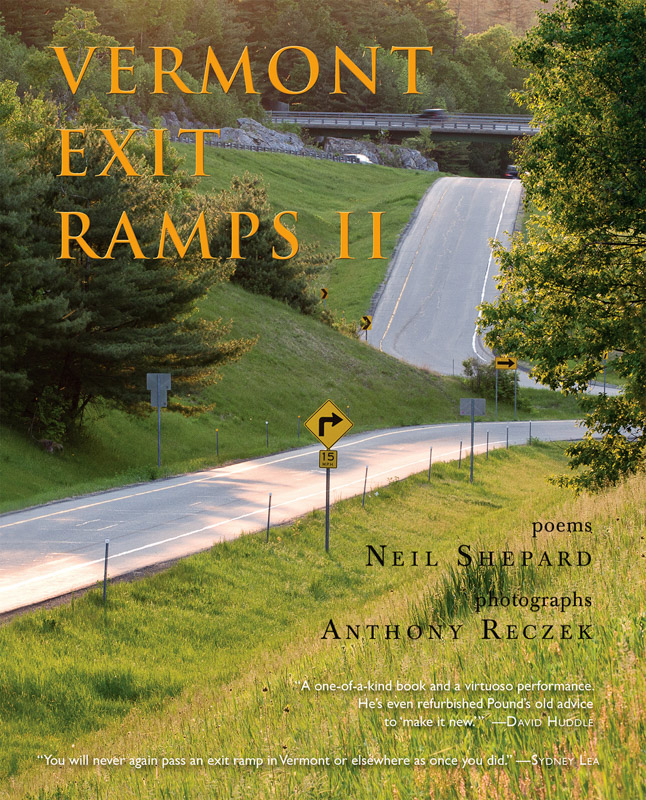The poet Neil Shepard, an old friend from college days, had some time on his hands after taking an early retirement from an undergraduate teaching career. He embarked on a multi-year project visiting all the Interstate exit ramps in the state of VT, and documenting those experiences in verse. I came along to photograph after the first year. Vermont Exit Ramps II is the result, where the reader is invited “to wander through the surrounding ramplands, towns and hilltop farms and to discover historical realities and imagined alternatives.”*
The book has forty poems and even more photographs, and we’re both pretty pleased with how it turned out.
To purchase and/or for more info, visit the publisher websites, Sundog Poetry or Green Writers Press. It can also be found at Amazon, where you can preview some of the pages.
Here’s the wonderful intro from Sundog Poetry Co-President Tamra Higgins at the Book Launch last month in Jeffersonville, Vermont:
TONY’S INTRO
Anthony Reczek is a New England photographer who has captured the natural beauty of our region for decades. I don’t know Tony personally, so I can only know him through his work and through the sporadic interactions I’ve had with him through email as we worked on this book. Well, that and a couple of good stories from Neil. But if Tony’s work is any indication of the man, then it is truly an honor to have him here with us this evening.
As in the poems in Vermont Exit Ramps II, Tony’s photographs capture the sacred and the mundane. Or, I should say the sacred in the mundane. In these photos we see the continuation of life in all its beautiful forms, from the Vermont hills and scenery that he somehow keeps from being too sentimental and clichéd, to the players in a softball game, to a brook with Tibetan prayer flags, to monuments that show more about the granite worker who created it than who is commemorated by it.
In VER 2.0, as Tony refers to the book, I’m struck over and over again by the juxtaposition of opposing elements: the softness of a pine sapling growing out of a craggy outcropping, an old women bent against the cold with a young boy racing in his vibrant youth, an old farm implement showcased in front of a brand new welcome center, a group of teenagers fishing against the ancient backdrop of our land, and one of my favorites, a cow eating hay next to a huge concrete piling holding up a segment of interstate. In these photographs modernity collides with the past, softness frames harshness, Vermont’s green folds itself around stark man-made signs….and trucks…and us.
How fortunate we are to have the long-lasting friendship between Tony and Neil transubstantiated into this book.
NEIL’S INTRO
Neil Shepard is an accomplished editor, teacher, mentor, and what we are here to celebrate this evening: poet. Vermont Exit Ramps II is his seventh book of poetry.
Contained in the poems of this book is the study of exit ramps, or ramplands as Neil refers to them. Through Neil’s close examination of these commonplace spaces, we see and learn and are reminded of extraordinary spaces in Vermont. And, it has taken someone extraordinary to not only think about writing about these spaces, but to think long and hard about them, creating these poems so that we too can explore certain spaces that lie, not out in the landscape, but within ourselves.
Take for example, the opening to his poem, “I-91, Exit 21: St. Johnsbury” on page 93:
“The ramp’s a swooping timeless curve, make that
a horseshoe, a rainbow, a perfect parabolic arc,
like luck or justice that turns us north to south….”
Through the lyric travelogue of Vermont Exit Ramps II, not only do we learn about Vermont’s landscape, geography, history, and even sociology, but how we learn it is through the irony, wit and wisdom, which is pure Shepard-style as in the poem “I-89, Exit 8, Montpelier” on page 8 and 9:
“…Montpelier lost its last
clothespin store in 2007, the last in America
before it burned. Today’s primary business is fire
and life insurance. And government. Senators
serve best who bring home the bacon, the dairy
subsidy, the maple syrup tariff….”
Galway Kinnell once said, “The more we become part of our world, the more we’re able to write poetry.” In order to write the poetry in Vermont Exit Ramps II, Neil went on a multi-year quest to be part of a very specific piece of our world. Through the close study of these ramplands, he succeeds in what only accomplished poets can do. He creates poetry in which the personal become universal and, in this case, in which somehow, through its unique quirkiness, Vermont becomes Everywhere.
Please welcome, the poems of Neil Shepard and the photographs of Anthony Reczek.
*from the back cover
